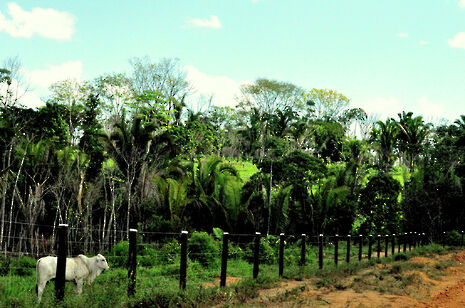Green Spaces: from meat-free Mondays to veganism
Laura Schubert explains why meat-free Mondays are a desperately needed change

We need to think about our diet.
It is clear that our diet is something that many people are concerned about. Over the past 50 years, as people make increasing connections between their health and the food they put into their body, a whole variety of trends regarding our diets have come and gone: from the controversial paleo diet to veganism. But now a new issue seems to predominate: climate change and the impact our food production has on the environment.
There is a potent environmental argument for reducing our consumption of meat and dairy products, as the industry has manifold harmful impacts through greenhouse gas emissions, land use, deforestation and excessive freshwater use. There’s no space here to list all 101 reasons, but here are some facts and figures: the United Nations among other organisations have established that the livestock sector is responsible for about 15 per cent of carbon emissions, which is more than all the cars, planes, buses, trains, and other forms of transport combined. There is the problem of water, air, and soil pollution due to animal waste contributing to species extinction and desertification, and in the USA over 50 per cent of freshwater is used on growing feed crops for livestock.
This brings us to the problem of inefficiency: much energy and water is wasted by producing feed for animals rather than producing grains for direct consumption, and this is leading cause (80 per cent of the total) for the deforestation of the Brazilian Amazon. Many people are also concerned with the health implications of meat consumption, as well as the ethical ones of animal welfare, and also worker exploitation in the meat industry.
So what is our possible course for responsive action? A range of measures have been touted, from going vegan, to becoming a ‘reductarian’ and forfeiting meat on Mondays. The latter is a movement advocated by former Beatle Paul McCartney, and follows the idea that even removing meat consumption from just one day of the week can have a huge impact, as one calorie of beef can take 27 times more energy to produce than one calorie of soybeans. See the Cambridge University Vegan Society for a group of people who advocate vegan food (often cake) for its creativity, good taste, health benefits and lower environmental impact.
On the other hand Emma Bryan, Sidney Sussex Green Officer, reasons “It's not realistic to expect everyone to become vegan just like that. But it's our responsibility as a generation of educated and enterprising individuals to take the lead in tackling climate change, with our attitudes more than anything”. What about meat-free Mondays? At this university, where much of our food is provided by our hall/canteen/buttery in college, you may say taking this course of action is difficult.
A member of the Vegan Society recently suggested in a well-written article that people should take it upon themselves to make the meat-free Monday pledge. But I don’t think this is enough, and it seems that Sidney Sussex JCR would agree. The motion put forward to have meat-free Mondays in hall “passed with a resounding majority at the end of Michaelmas” and is in the process of being implemented. This same institutional ‘attitude’ change is happening at four constituent colleges in Oxford, but is still met with much controversy.
Those who choose to eat meat may claim they are being discriminated against, or their free will is being undermined. Here we come onto the territory of public health and planetary intervention; my personal opinion is that this is for the better and is sometimes necessary. Emma further explains that “the aim of starting meat-free Mondays in Sidney was to make people think about how our choice of diet can have such a huge impact on global issues”, as opposed to making everyone vegetarian or vegan.
The other argument is that the attitudinal change has to come from individuals themselves. It is an argument often touted by the catering staff, who will not provide more vegetarian meals if 70 per cent of people want meat. But I think this ignores simple aspects of human psychology, such as the capability to dissolve one‘s own resistance to change, and also overlooks the urgency of climate change. Progress through ‘supply and demand’ is too slow, and as students we could and should lead this campaign across the whole university, and beyond the city.
We can each make our own choices, but collective choices are what become truly powerful and lasting. This is what we need in Cambridge. Meat-free Mondays are not the only way forward (and I commend all vegans for their choice and dedication), but I think that it is the start we have to make.
On Tuesday 17th May 7:30-9:30pm, at St John’s College, there will be a discussion about this issue, titled 'Eat Cambridge' and organised by the Cambridge Carbon Footprint society.
 News / Caius mourns its tree-mendous loss23 December 2025
News / Caius mourns its tree-mendous loss23 December 2025 Comment / Yes, I’m brown – but I have more important things to say22 December 2025
Comment / Yes, I’m brown – but I have more important things to say22 December 2025 News / Cambridge welcomes UK rejoining the Erasmus scheme20 December 2025
News / Cambridge welcomes UK rejoining the Erasmus scheme20 December 2025 News / CUP announces funding scheme for under-represented academics19 December 2025
News / CUP announces funding scheme for under-represented academics19 December 2025 Interviews / Politics, your own way: Tilly Middlehurst on speaking out21 December 2025
Interviews / Politics, your own way: Tilly Middlehurst on speaking out21 December 2025








